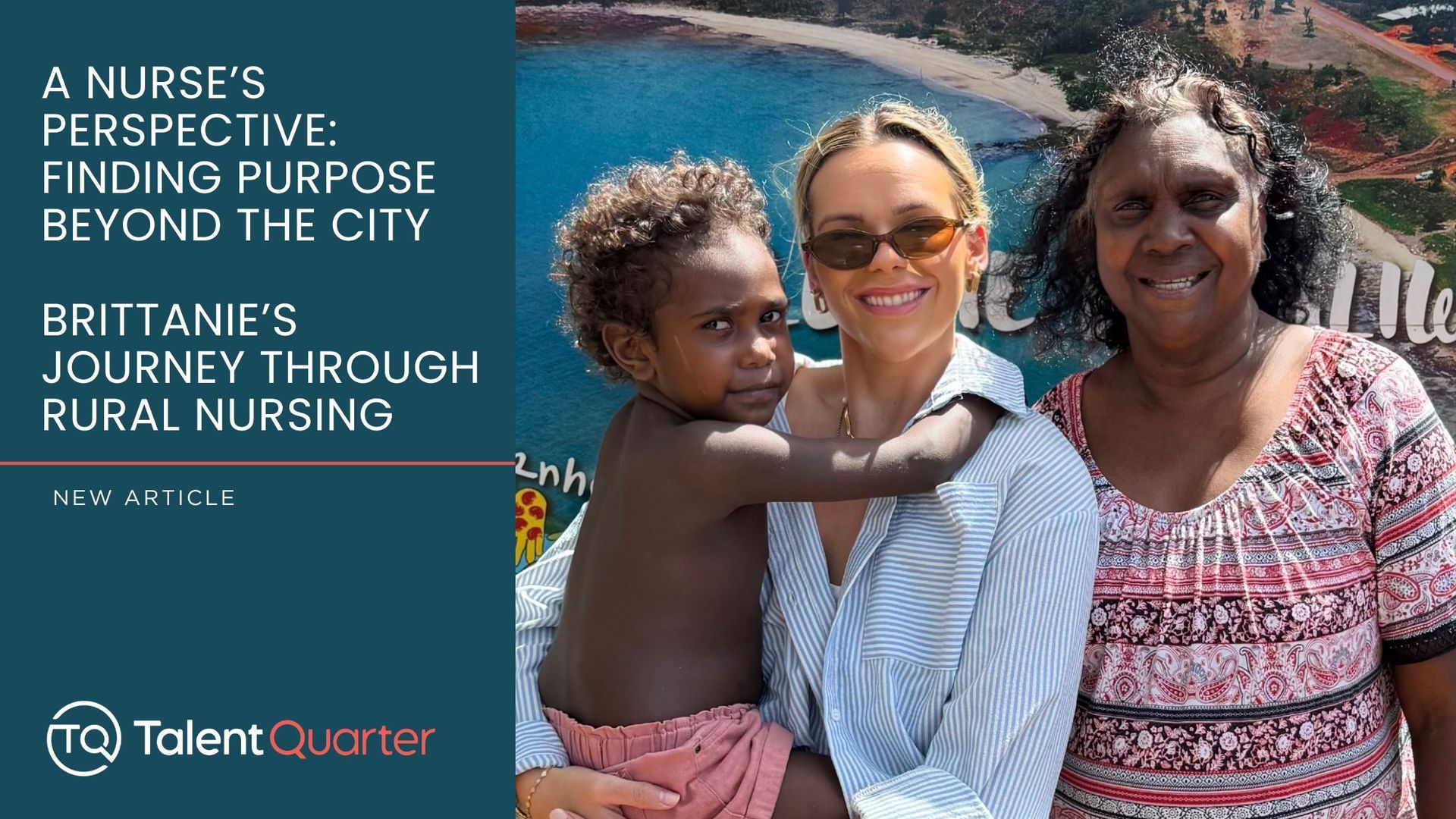What’s new in regional medicine and why it might be right for you!

There’s a feeling that working in regional or remote medicine was a short-term career detour, a rite of passage or a last resort. But times are changing. Today, rural and regional medicine in Australia offers not only a professional challenge and real community impact but also genuine career growth, flexibility, and lifestyle benefits.
If you’re a doctor thinking about what’s next, here’s why regional medicine might be exactly the right move for you, right now.
What’s new in regional medicine?
Healthcare investment across regional Australia has grown significantly in recent years. Rural hospitals and clinics are being upgraded, telhealth is expanding, and more funding is flowing into rural health services through State, Territory and federal programs.
Gone are the days of doctors in regional locations working in splendid isolation. New models of care mean you’re now more likely to work within supportive multidisciplinary teams, with improved access to specialist consults via telehealth and better on-call rosters.
With digital health advancements, both regional GPs and specialists are more connected than ever. Tools like My Health Record, electronic prescribing, and virtual meetings mean continuity of care and collaboration don’t stop at the metro city limits.
Equally, regional medicine is not the same as working in a metro location. Doctors in regional locations do tend to have a more generalist practice, which can include emergency care, procedural work, like, for example obstetrics or minor surgery. Whilst there is more support than ever, there is still a greater level of autonomy and decision-making which many doctors enjoy.
Regional medicine gives doctors the chance to work across a broad clinical spectrum, from general practice to emergency care, chronic disease management, and procedural work:
‘You’ll do in a week what would take six months in a metro practice,’ said one of our regional GP candidates. ‘It’s the best clinical experience I’ve ever had.’
Rural communities also deeply value their healthcare professionals. In many cases you won’t just be a doctor but a trusted and integral member of the community. Regional medicine can be a role with meaning, visibility, and purpose, because one of the other major differences between metro and regional Australia, is of course the demography.
Approximately 9 million people live in regional, rural, and remote areas, which equates to around 35% of Australia’s total population.
Regional populations tend to be older than metro ones, with a higher proportion of people aged over 50 and most regional areas have a predominantly Australian-born population, although cultural diversity is growing, especially in larger regional centres through both skilled migration and regional settlement programs.
Regional and remote Australia is of course home to a significant proportion of Aboriginal and Torres Strait Islander peoples, particularly in very remote areas where they may represent the majority of the population.
Regional households also tend to have lower average incomes than urban households, but more often than not, this is offset by lower costs of living and housing affordability.
From a health perspective, these differences tend to manifest in higher rates of chronic illness and mental health issues, more indigenous patients with culturally diverse care needs and of course, that strong sense of community connection between doctor and patient.
So, what about living in regional Australia – what’s the lifestyle like and how is that sense of community created?
Australia’s regional towns are increasingly appealing to healthcare professionals seeking a lifestyle that blends meaningful work with a strong sense of community, affordability, and a connection to nature. As the demand for balance grows, regional Australia offers a compelling alternative to the fast pace of major cities.
A lifestyle that works for you
Compared to metropolitan centres like Sydney and Melbourne, regional areas typically offer more affordable housing, lower living expenses, and an improved quality of life. Whether you’re renting or purchasing a home, you’re likely to find more space and value for your money which is a significant advantage for both families and individuals planning for the long term.
Your career can thrive outside the city
Regional Australia is not just about scenic landscapes, it’s home to vibrant and growing industries, including agriculture, mining, tourism, education, renewable energy, and of course, healthcare. Many regional healthcare providers are actively recruiting, offering competitive salaries and a genuine work-life balance.
Get time back in your life
One of the key lifestyle benefits of regional living is the reduced pace and minimal commuting time. Forget the hours spent in traffic or on a bus or a train, in regional towns, your workplace is often just minutes away. This gives you more time to enjoy outdoor activities, connect with your family or new friends, and unwind in the great outdoors, all of which help reduce stress and improve your overall wellbeing.
A community you can genuinely belong to
Perhaps the most distinctive feature of regional life is its strong sense of community. Whether you’re relocating solo, with a partner, or as a family, you’ll find a welcoming environment where people know and support each other. Community events, sports teams, and local initiatives make it easy to get involved and form meaningful connections, something which can be missing in larger cities.
Whether you’re early in your career or looking for a meaningful change, regional, rural and remote roles can now offer many of the things that metro-based positions can, but in a different and often more rewarding environment. As a recruitment agency with strong partnerships across Australia, at Talent Quarter can help you:
- Explore locum, short-term, or permanent positions
- Find a location and practice style that suits you
- Access relocation support
To have a confidential conversation about what a move to regional medicine could look like for you and how we can help get you there, email elena.ryan@talentquarter.com and she’ll be in touch to arrange a convenient time to talk.
Don’t forget, regional Australia offers more than just a change of scenery. It’s an opportunity to grow your career, enjoy a healthier lifestyle, and become part of a connected, supportive community. For a doctor, making this move could be the best decision you’ll ever make.


Talent Quarter is a trusted healthcare recruitment partner in Australia, connecting qualified nurses, doctors, allied health professionals and carers with organisations in need. We provide locum, permanent, travel and shift-based roles, delivering workforce solutions that strengthen teams, improve retention and safeguard patient care.
LET’S GET CONNECTED
#ConnectionsWithImpact
QUICK LINKS
FIND TALENT
FIND JOBS

Talent Quarter is a trusted healthcare recruitment partner in Australia, connecting qualified nurses, doctors, allied health professionals and carers with organisations in need. We provide locum, permanent, travel and shift-based roles, delivering workforce solutions that strengthen teams, improve retention and safeguard patient care.
LET’S GET CONNECTED
#ConnectionsWithImpact
QUICK LINKS
FIND TALENT
FIND JOBS

In the spirit of reconciliation, Talent Quarter acknowledges the traditional custodians of country throughout Australia and their connections to land, sea and community. We pay our respect to their elders past and present and extend that respect to all Aboriginal and Torres Strait Islander peoples today.
We welcome all cultures, all religions, all colours, all beliefs, all ages, all sizes, all types, all people.

We welcome all cultures, all religions, all colours, all beliefs, all ages, all sizes, all types, all people.

In the spirit of reconciliation, Talent Quarter acknowledges the traditional custodians of country throughout Australia and their connections to land, sea and community. We pay our respect to their elders past and present and extend that respect to all Aboriginal and Torres Strait Islander peoples today.

We welcome all cultures, all religions, all colours, all beliefs, all ages, all sizes, all types, all people.
Talent Quarter. All rights reserved.
Talent Quarter. All rights reserved.


